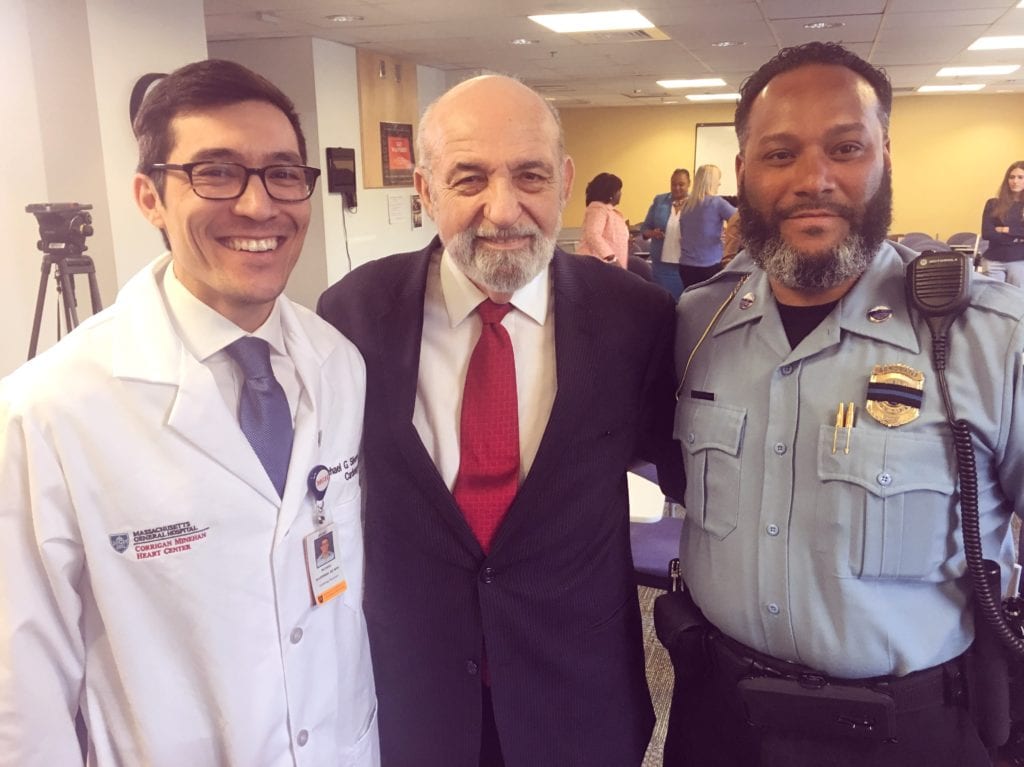Arroyo comes back from cardiac arrest, coma
A week after doctors doubted he'd fully revive, he says he's ready to go back to work

Hours after Suffolk County Register of Probate Felix D. Arroyo suffered cardiac arrest May 4, collapsing on the floor of Boston City Hall, many feared the worst. As the days drew on and Arroyo remained in a coma, family members and supporters held a prayer vigil at a Lower Roxbury church.
Some questioned whether Arroyo would revive or fully recover. In a move that usually signals an impending death, doctors sent a grief counselor to meet with family members.
But on Tuesday morning, Arroyo appeared to have defied all odds, strolling into a press conference to announce his full recovery.
“Today I am alive because of love,” he told reporters, surrounded by family members, his doctor and Boston Municipal Police Sergeant Roman Colon Jr., who performed CPR on him after he collapsed, and revived him with a defibrillator.
“Many of you, many more than I could have imagined, have shown love for me with your prayers or good wishes, and others with your skills,” Arroyo continued. “Thank you.”
Lying on the floor of the City of Boston Credit Union, Arroyo was still unconscious after Colon revived him. The emergency medical team arrived soon after and rushed Arroyo to Massachusetts General Hospital Emergency Department. At MGH, he was not awake or following commands, so he was diagnosed as comatose following an out of hospital cardiac arrest. He was then admitted to the cardiac intensive care unit, where doctors had to support his blood pressure with medications and put him on a breathing machine. They also treated him with therapeutic hypothermia, a medically induced coma used to keep the body cool to preserve brain function.
At one point, doctors told Arroyo’s family members he had a 10 percent chance of making a full recovery. But over time, Arroyo gradually showed improvements in brain function. One morning, he began to follow simple commands from the medical staff, showing that his brain was recovering. After several days, as Arroyo continued to improve, he was moved out of intensive care and eventually discharged, marking a full recovery.
Arroyo’s recovery would not have been possible with the swift response from Colon, according to his doctor, Michael Silverman.
“By Roman being able to react as quickly as he did to begin CPR and resuscitate Mr. Arroyo in the field, it [gave] us the opportunity to take care of him,” he told reporters.
Long active in Boston’s civic and political spheres, Arroyo, 70, was elected Register of Probate in 2014, becoming the first Latino to be elected to statewide office in Massachusetts history. In a controversial move, the Trial Court removed Arroyo from his post in February of 2017, alleging he mismanaged the office. Arroyo responded by asserting he was undermined by racially biased staff and that the Trial Court denied him resources necessary to run the office.
A report by an independent investigator hired by the Trial Court cleared Arroyo of wrongdoing. He returned to work in October.
During his time in the hospital, community members rallied around his cause, with more than 100 people turning out to a prayer vigil held at the Lion de Juda church in Lower Roxbury May 7.
During his press conference Tuesday, Arroyo said he is ready to return to civic life. When asked when he would be returning to work, Arroyo responded immediately, “Tomorrow. They have been without me for long enough.”






